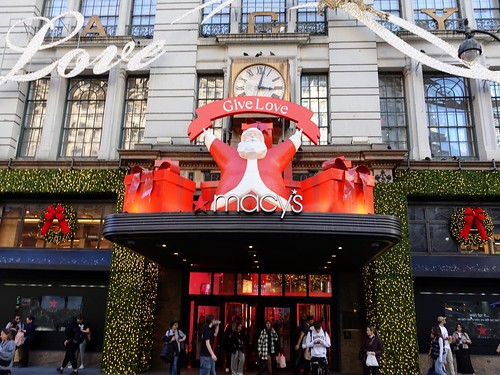At least 50 major retailers have jacked up interest rates on store-branded credit cards to all-time highs — even as inflation continues to dog shoppers nationwide, according to an explosive new study.
Big chains including Macys, Gap, TJ Maxx and Petco hiked APRs on their store-issued credit cards before the Federal Reserve began slashing rates in September, according to a CNBC report that was based on Bankrate.com data.
The retailers are pushing rates to 30% and above — an all-time record that breaks an unspoken APR maximum of 29.99% for the first time in years.
That’s despite the fact that economists expect the government’s lending rates to ease further in the coming months.
While there are no federal caps on rates, companies are required by law to clearly post and alert customers to changes. Experts are advising shoppers to think twice before signing up for new cards in the thick of the holiday season.
If you get offered one of these this holiday season, really take a breath. I would just say no if youre going to carry a balance, Bankrate analyst Ted Rossman said. We hear many times people sign up for these cards and they dont even realize what theyre getting into.
Discount retailer Big Lots which filed for bankruptcy in September raised its APR by 6 percentage points from 29.99% to 35.99%, the largest increase of the 100 retailers analyzed by Bankrate.
Gap made the second-largest increase, raising the rate on its Banana Republic, Athleta and Old Navy cards by 5 percentage points to 34.99%. Petco came in third with a 4.5-percentage-point hike to 35.99%.
The moves look like a bid by major retailers to maximize profits as the crucial holiday season ramps up. Nearly half of Macys operating profits in 2022 came from its credit card program, according to a 2023 report by Citi analyst Paul Lejuez.
In May, Macy’s raised its full-year forecast on credit card revenues due to better-than-expected profit share resulting from higher balances within the portfolio, finance chief Adrian Mitchell said on a call.
In August, Mitchell said the companys revenue was being helped by consumers keeping credit card balances for longer than expected.
Macy’s upscale Bloomingdale’s chain raised its APR by 2.5 percentage points to 34.49%. TJX, which owns TJ Maxx, Marshalls and Homegoods, hiked its APR by 2.75 percentage points to 34.99%.
Big Lots, Academy Sports, Burlington, Michaels and Petco are tied for the highest APR at a whopping 35.99% as of September, according to the CNBC report.
A spokesperson for Big Lots told CNBC that APR changes are made responsibly and in line with overall industry standards.
Big Lots partner bank, Comenity, said the interest rate hikes were due to several factors including historical federal rate increases, rising credit losses and regulatory pressures.
Some companies, like Macys, Nordstrom, and TJX, have brought their rates down to correspond with the Feds half-point cut but their APRs are still between 2 and 2.5 percentage points higher than a year ago.
A spokesperson for Nordstrom told CNBC the APR adjustment made sure the rate was aligned with the current economic environment.
Macys, Burlington, TJX Companies, Gap, Petco and Big Lots did not immediately respond to The Posts requests for comment.
Store credit card sign-ups have declined in popularity as younger shoppers enjoy buy now, pay later options like Klarna and Afterpay so retailers need to earn more from a smaller group of customers, hence the hefty interest rates and staggering late fees.
Most credit cards, including store cards, are tied to the central banks federal funds rate so retailers bumped up their rates ahead of the Feds highly anticipated cuts. Retailers and their banking partners usually split the revenue when customers pay interest or a late fee on their card.
All of the major retailers reviewed by CNBC raised their rates before the Feds cuts at times when investors were placing high odds on the central bank lowering interest rates.
The APRs on retail credit cards rose 1.52 percentage points on average between September 2023 and September 2024, while traditional credit cards’ rates only rose by 0.08 percentage points, according to Bankrate data.
The average APR on a store credit card also grew 2.21 percentage points from November 2022 to September 2023, according to CNBC. Retailers raised their rates an additional 0.71 points compared to the Fed’s 1.5 point increase during the same period.
